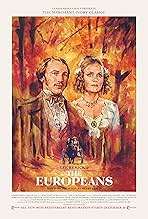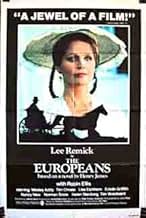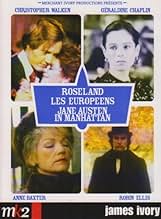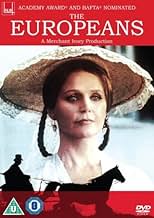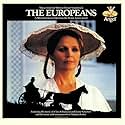NOTE IMDb
6,1/10
1,2 k
MA NOTE
Felix Young et Eugenia Munster sont nés et ont grandi en Europe et ont un style de vie quelque peu bohème reflétant leurs voyages à travers l'Europe pendant le XIXe siècle.Felix Young et Eugenia Munster sont nés et ont grandi en Europe et ont un style de vie quelque peu bohème reflétant leurs voyages à travers l'Europe pendant le XIXe siècle.Felix Young et Eugenia Munster sont nés et ont grandi en Europe et ont un style de vie quelque peu bohème reflétant leurs voyages à travers l'Europe pendant le XIXe siècle.
- Réalisation
- Scénario
- Casting principal
- Nommé pour 1 Oscar
- 1 victoire et 6 nominations au total
Richard Robbins
- Musician
- (non crédité)
Donald Warnock
- The Dandy at the Ball
- (non crédité)
Avis à la une
I first saw this movie in a "Henry James on Film" class back in about 1994. I'd just read the novella of the same name and enjoyed it immensely. Not only was it remarkably beautiful and deeply moving but also, at moments, intentionally laugh out loud funny.
MIP, as is their way I later discovered, created a script that fails to recognize the difference between the written word and the spoken word/visual image. The camera work is beautiful, and all the superficial details seem so right (furnishings, clothes, surfaces in general), all of which I've found to be typical of MIP films. What a pity they didn't devote at least some of that time to other matters, such as understanding the characters involved. Lines are lifted directly from the novella, with little or no attempt to adapt them to the demands of the big (or small) screen.
As a result, all of the glorious subtlety of the original is lost, absolutely lost. James' characters are complex, yes, but also thoroughly real, human, and comprehensible, despite what some of his critics may claim. You wouldn't know that from any of the MIP adaptations of his works, specifically THE BOSTONIANS and THE GOLDEN BOWL. I've yet to see HULLABALOO OVER GEORGIE AND BONNIE'S PICTURES, which is, according to certain film critics, and suggested by what I've read about the film, an adaptation of James' "The Aspern Papers." Ivory has been asked about this, but has refused to answer one way or the other.
It doesn't help that MIP films have tended to be shot on such tight time/money budgets that it may be impossible to shoot all the scenes that were scripted, let alone to reshoot a scene when needed. As such, they rely heavily on editing the footage they have. Anyone who studies their films may well find that this approach leads to most unsatisfying results.
I've seen ten or more MIP films since this one, in an attempt to determine if this was an isolated misstep on their part, or the norm for them. I found the latter to be the case. Their films make me think of the children's fairy tale of the emperor who had no clothes. But, in the case of MIP fare, it's just the reverse: it's all clothes -- and no emperor!
MIP, as is their way I later discovered, created a script that fails to recognize the difference between the written word and the spoken word/visual image. The camera work is beautiful, and all the superficial details seem so right (furnishings, clothes, surfaces in general), all of which I've found to be typical of MIP films. What a pity they didn't devote at least some of that time to other matters, such as understanding the characters involved. Lines are lifted directly from the novella, with little or no attempt to adapt them to the demands of the big (or small) screen.
As a result, all of the glorious subtlety of the original is lost, absolutely lost. James' characters are complex, yes, but also thoroughly real, human, and comprehensible, despite what some of his critics may claim. You wouldn't know that from any of the MIP adaptations of his works, specifically THE BOSTONIANS and THE GOLDEN BOWL. I've yet to see HULLABALOO OVER GEORGIE AND BONNIE'S PICTURES, which is, according to certain film critics, and suggested by what I've read about the film, an adaptation of James' "The Aspern Papers." Ivory has been asked about this, but has refused to answer one way or the other.
It doesn't help that MIP films have tended to be shot on such tight time/money budgets that it may be impossible to shoot all the scenes that were scripted, let alone to reshoot a scene when needed. As such, they rely heavily on editing the footage they have. Anyone who studies their films may well find that this approach leads to most unsatisfying results.
I've seen ten or more MIP films since this one, in an attempt to determine if this was an isolated misstep on their part, or the norm for them. I found the latter to be the case. Their films make me think of the children's fairy tale of the emperor who had no clothes. But, in the case of MIP fare, it's just the reverse: it's all clothes -- and no emperor!
While not on the level of Howard's End and other Merchant/Ivory films at their later peak, this film is where they truly took off in presenting period films. the look and details are excellent as has been commented on here. The cinematography is particularly wonderful in capturing a beautiful New England autumn, especially the sunlit buggy-ride with Robert Acton and the baroness. What is serendipitous is that the company wanted to film in May and June, when the book is set but filmed in Fall because that's when they got the money. The autumn here is practically a character in itself, and were the film set in a very green June, would look less like New England and might have been anywhere, and the constant reminder of the puritanical background of old New England would have been lost.
The casting is also very good. I take issue with some earlier views in that I find Lee Remick excellent as the Baroness. Faye Dunaway would haveseemed too aristocratic, and Jane Fonda still a bit too young, at leastin looks. Lee Remick is a bit too good looking to be the Baroness of thebook who is a plain looking woman who carries herself as if she is abeauty. Wesley Addy is a perfect Patriarch and Felix was played with much youthful gusto by Tim Woodward, who also looked perfect for the part.
It is not always considered fair or useful to compare aspects of a literary adaptation And its source book but in this case it's so literal that it is valid to an extent. Two major differences do stand out and add to the overall film.
The role of Clifford ,the young son is expanded and brought more forward in the film, especially his comic visits to the Baroness. Tim Choate did a wonderful job of creating his awkward, smiling,humorous young Yankee who in the novel seldom gives more than "a growl" to any question.
The addition of the big party scene at the Acton house(there is none in the book) was a wonderful inspiration. A period piece like this needs a scene to really show off how everyone would look at their best and the attention to detail of dance and music was obviously great. As the Baroness says, "They're quite exuberant"
The problem many people may have with the film is that the characters' motives and desires may seem a bit unclear, this despite almost all the dialog being taken directly from the novel. But this is not one of those later Henry James novels where three pages of exposition of thought and motive precedes each spoken sentence but rather a short and simple book which is faithfully recreated here on film.
The Baroness finds what she is looking for (money) but feels not enough passion from the man ("I am admired in Europe")and not enough to enjoy in the staid community ("She has grown tired of us" She leaves but most everyone else finds exactly what they were looking for.A fine film.
The casting is also very good. I take issue with some earlier views in that I find Lee Remick excellent as the Baroness. Faye Dunaway would haveseemed too aristocratic, and Jane Fonda still a bit too young, at leastin looks. Lee Remick is a bit too good looking to be the Baroness of thebook who is a plain looking woman who carries herself as if she is abeauty. Wesley Addy is a perfect Patriarch and Felix was played with much youthful gusto by Tim Woodward, who also looked perfect for the part.
It is not always considered fair or useful to compare aspects of a literary adaptation And its source book but in this case it's so literal that it is valid to an extent. Two major differences do stand out and add to the overall film.
The role of Clifford ,the young son is expanded and brought more forward in the film, especially his comic visits to the Baroness. Tim Choate did a wonderful job of creating his awkward, smiling,humorous young Yankee who in the novel seldom gives more than "a growl" to any question.
The addition of the big party scene at the Acton house(there is none in the book) was a wonderful inspiration. A period piece like this needs a scene to really show off how everyone would look at their best and the attention to detail of dance and music was obviously great. As the Baroness says, "They're quite exuberant"
The problem many people may have with the film is that the characters' motives and desires may seem a bit unclear, this despite almost all the dialog being taken directly from the novel. But this is not one of those later Henry James novels where three pages of exposition of thought and motive precedes each spoken sentence but rather a short and simple book which is faithfully recreated here on film.
The Baroness finds what she is looking for (money) but feels not enough passion from the man ("I am admired in Europe")and not enough to enjoy in the staid community ("She has grown tired of us" She leaves but most everyone else finds exactly what they were looking for.A fine film.
"An archetype of Merchant-Ivory period production, THE EUROPEANS is a film adaptation of Henry James' eponymous 1878 short novel, mid-19th century, the Wentworths are a wealthy family dwelling in rural Boston, and Mr. Wentworth (Addy) has three adult children, Charlotte (New), Gertrude (Eichhorn) and Clifford (Choate), while the family intends to tie the knot between a nonconformist Gertrude and the local Unitarian minister Mr. Brand (Snow), she finds no peace in his puritanical values, one day, her encounter with her cousin hitherto she has never met before, Felix Young (Woodward), sows the romantic seeds in both hearts."
read my full review on my blog: cinema omnivore, thanks
read my full review on my blog: cinema omnivore, thanks
Filmed in typical lush Merchant-Ivory fashion, this film left me feeling confused. I wanted to like it, and certainly enjoyed the sumptuous visuals, but it simply failed to lift off the launch pad.
This film is a masterpiece as are all of the Merchant/Ivory's films. The absorbing story and adaptation, the fantastic actors - notably the immensely beautiful Lee Remick - and the eye for detail makes this a unique experience and may be watched again and again.
Le saviez-vous
- AnecdotesFirst of three film adaptations by Merchant Ivory Productions of novels by Henry James. The second would be Les Bostoniennes (1984) whilst the third was La coupe d'or (2000). Each film was produced by Ismail Merchant, directed by James Ivory and had a screenplay written by Ruth Prawer Jhabvala.
- Bandes originalesTrio, Opus 17
Composed by Clara Schumann
Meilleurs choix
Connectez-vous pour évaluer et suivre la liste de favoris afin de recevoir des recommandations personnalisées
- How long is The Europeans?Alimenté par Alexa
Détails
- Date de sortie
- Pays d’origine
- Sites officiels
- Langues
- Aussi connu sous le nom de
- The Europeans
- Lieux de tournage
- Société de production
- Voir plus de crédits d'entreprise sur IMDbPro
Contribuer à cette page
Suggérer une modification ou ajouter du contenu manquant



